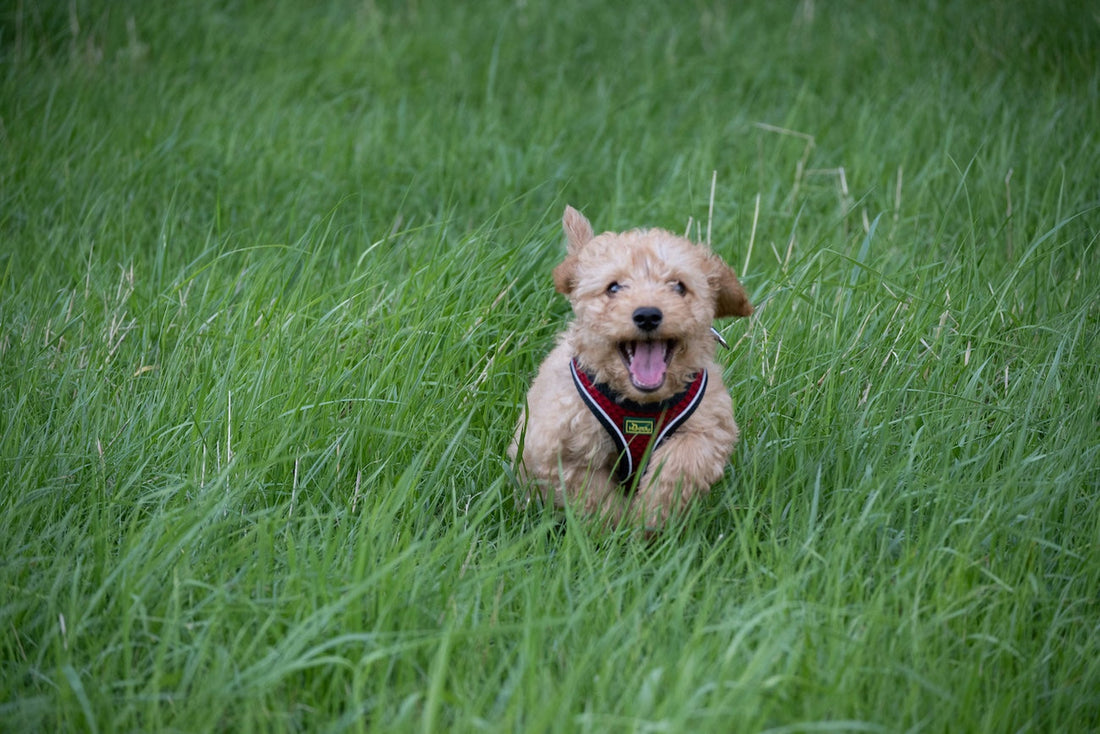Exercising My Puppy – How Much Is Too Much?

Many owners of new puppies are advised to restrict their exercise, recommending five minutes for every month of age, to prevent joint problems.
There is no scientific evidence to back this up, meaning that this is probably based on opinion, which is often outdated. What we do know is that diets high in protein and fat promote a fast growth which can be detrimental to their skeletal growth and joint health.
Puppies need to exercise!
Is it any wonder that your puppy is barking and whining incessantly or being destructive in the home with all that pent-up energy?
Running and playing is beneficial for strengthening bones and joints and helps to build muscle. Just think of wild dogs, whilst running and playing for hours they build up physical strength as well as practising their life skills.
Restricting exercise will not only have an impact on the development of their skeleton and lead to behaviour issues, it can also pile on the extra pounds. Fat puppies often become obese adults shortening their lifespan considerably.
Getting out and about also increases your puppy’s confidence and socialisation. Giving them this opportunity to explore will help them to learn about the world around them. Meeting other dogs out and about is great for socialisation but be sure to keep first meetings brief. Three seconds is enough time for dogs to greet each other and avoids any bad encounters.
So which type of exercise is appropriate for our little pups?
Of course, this is breed dependant; for example, a high energy pup such as a Collie or Spaniel will need more than a Bulldog or a giant breed such as a Great Dane.
Very young puppies will need to start off on short walks to get them used to lead walking. Slowly you can build up to longer walks on different surfaces to get them used to different environments.
Allow lots of play
Try a gentle game of tug or play hide and seek using food or a favourite toy. If it is somewhere safe and escape proof, you could even hide and wait for your puppy to find you. Swimming is also a great form of exercise on a warm day.
Make sure to keep training sessions short and fun filled. Your puppy will let you know when he or she is tired and should be allowed plenty of time to rest and sleep in a quiet area.
What type of exercise should be avoided?
When getting a puppy most people will look forward to the day when they can play fetch with their pup. However, it is best to avoid repetitive activities such as excessive ball throwing and constantly playing fetch whilst your puppy is still young. Not only can this put strain on joints and muscles, but some breeds become fixated on them.
Very strenuous activities such as agility, fly ball, running, cycling and fast hikes over a long distance should be left until they a fully grown, especially for larger breeds.
The benefits of exercising your pup
Ensuring that your puppy is getting enough of the right exercise has many benefits. As well as promoting physical well-being, exercise will help to support your pup’s mental health. This time spent with your pup will be invaluable to them as they will use this time to build a bond with you and create a loyal relationship.
Physically your pup will benefit from exercising their heart, muscles and joints. Keeping your puppy well exercised will have fantastic health benefits as they grow into adulthood.
As well as the health benefits of exercise, it is a great opportunity to socialise your pup with other dogs. This will help build their confidence and will be a useful learning process for them.
Save your furniture from destruction by motivating your puppy to release energy in a more productive, and fun, manner. Exercising and play will stop your puppy becoming bored and acting out.
